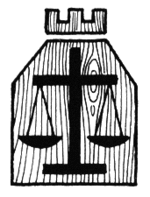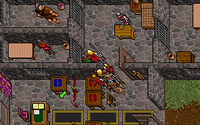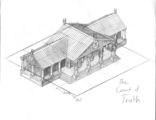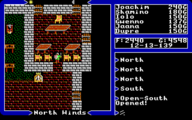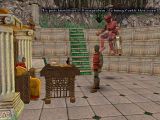High Court
The High Court of Yew (also known as the Court of Justice, or Hall of Justice) is the primary seat of Justice within the realm of Britannia, meting out judgment against those who transgress the kingdom's laws. Founded around the time of the enlightenment which followed Exodus' demise, the court has long overseen the administration of the land's judicial system, even under the unethical regime of Blackthorn and amidst the debased show trials of the column-afflicted world of Ultima IX.
History[edit]
Age of Enlightenment[edit]
First established in the wake of Lord British's reforms during the time of Ultima IV, this institution was first presided over by Judge Talfourd, who assisted the aspirant Stranger in obtaining the rune of the city.[1] In this age of radical philosophical rebirth, the attendants of the court extolled the virtue it oversaw as the search for Truth tempered with the sagacity of Love, and it was understood that such an administration would pass its judgments with consideration of mercy.
During the dark era of Blackthorn’s regency, however, the Yewish courts became the strong arm of the Oppression, enforcing harshly the edicts laid out in the tyrants Code of Virtues under the callous Judge Dryden. During these days of Blackthorn's regime, the High Court had little lenience to offer those who stood before it, and harsh penalties were liberally inflicted on the guilty, with even young children suffering retribution for non-compliance.
Following the restoration of the true king and Blackthorn's exile, the High Court appeared to revert to its former impartiality. By the time of the Gargoyle War, the halls of Justice were in the care of Lenora, a judge who also served as mayor of the surrounding city. Strict and uncompromising as far as her judgment was required, Lenora took on the task appointed her with obvious dedication and gravitas, and proved willing to allow the rune of the Justice to be lost rather than to unjustly release the thief who had stolen it.[2]
Age of Armageddon[edit]
Over the next two centuries, the changes in Britannian governance and culture shifted dramatically, giving rise to a bureaucratic high court appearing to just as frequently tend to cases of tax evasion as it did murder. By the time of the Avatar's return to the realm in Ultima VII, the court was overseen by an official known as Sir Jeff, who appeared to act more in the capacity of clerk than of high judge.[3]
Years later, following the ravages of the Guardian's incursions into the realm, the corrupting influence of the Red Titan's columns rendered Yew a city of spectacle, with the high court becoming an amphitheater of farcical pronouncements, catering to those who enjoyed the thrill of witnessing others' punishments. Upon conviction, criminals were teleported to the prisons of the converted Dungeon Wrong. Under the leadership of Judge Grey, the High Court condemned Raven, the beloved of the Avatar, to perpetual imprisonment for the genocide of the Gargish race, forcing the hero to rescue her.
Eventually, with the cleansing of the Shrine of Justice, the grip which the local column had over the community was lessened, and the court appeared to be restored to its former state, with Grey remorseful over the crimes it had perpetuated under his reign.[4]
Lore[edit]
| “ | The High Court of Yew judges all important cases in Britannia and is famed far and wide for the wisdom of the decisions rendered here. – from The History of Britannia (Ultima IV)
|
|---|
| “ | The Government, symbolised by the crown and the scales of justice, has its seat in the castle of Lord British, the king. But the government offices, where the day-to-day administration takes place, reside in Yew, the towne of justice. This centre houses the high court of justice and the public prison for all Britannia. – from The Book of Lore (Ultima V)
|
|---|
| “ | The citizenry of Yew have chosen a life independent of normal civilization. They now live scattered throughout the Deep Forest. Their only remaining link with outside civilization is Empath Abbey. The Abbey has assumed responsibility for the Court of Yew as well as its prison. – from The Book of Fellowship (Ultima VII)
|
|---|
| “ | Adjacent to our abbey is the prison and high court of Britannia. The official court records of all known criminals are there. Sir Jeff rules with an iron hand, leaving no slack for criminals or guards alike. I wonder how anyone can work for him. Even the legendary Avatar would have difficulty appearing scrupulous under Sir Jeff's watchful eye. But, that is between him and his jailer. And his prisoners ... – from Key to the Black Gate (Ultima VII)
|
|---|
Ultima V: Lazarus[edit]
This is an Ultima V: Lazarus-related article or section. The information within may not apply to Ultima V or other Ultima games.
In Ultima V: Lazarus, it is mentioned that Blackthorn's father was the high judge of the court for a long time, and presided over the trial of the pirate Windemere, which eventually lead to his suicide.
Trivia[edit]
- While the Avatar may be imprisoned by the High Court in various games after committing a crime, it is always possible for the hero to escape from the Yewish prisons.
- While in the final Ultima IX the court was shown as a fairly minimalistic and unrealistic design, with little in the way of facilities for the judge, concept art reveals that originally, an entire building had been planned. Also, it was called the "Court of Truth". The design of the building can be seen in the gallery below.
Gallery[edit]
References[edit]
- ↑ Talfourd. Underworld Dragon’s Ultima IV transcript. Ultima IV. "rune".
- ↑ Lenora. Underworld Dragon’s Ultima VI transcript. Ultima VI. "allow, deal, free, go, let, out, release, rune, swap, trade".
- ↑ Sir Jeff. Underworld Dragon’s Ultima VII transcript. Ultima VII. "job, official".
- ↑ Grey. Quill Dragon’s Ultima IX transcript. Ultima IX.
